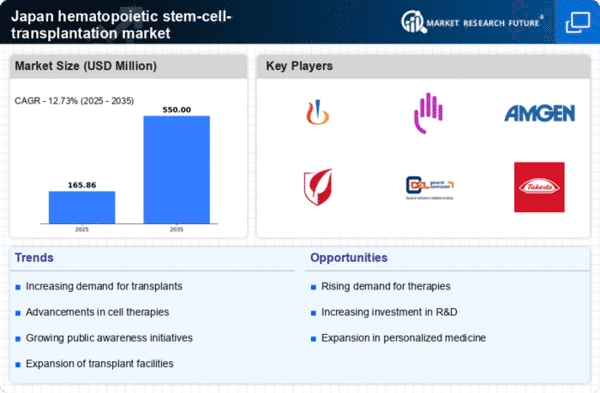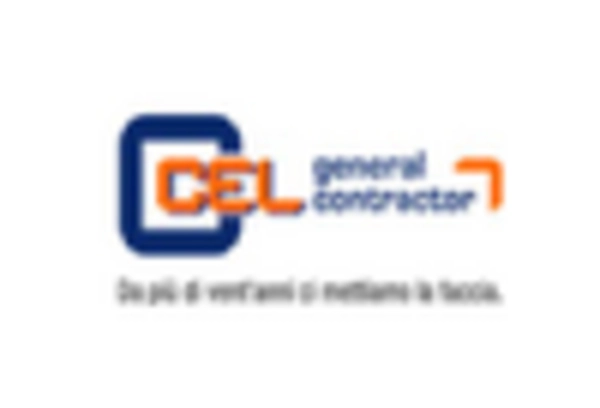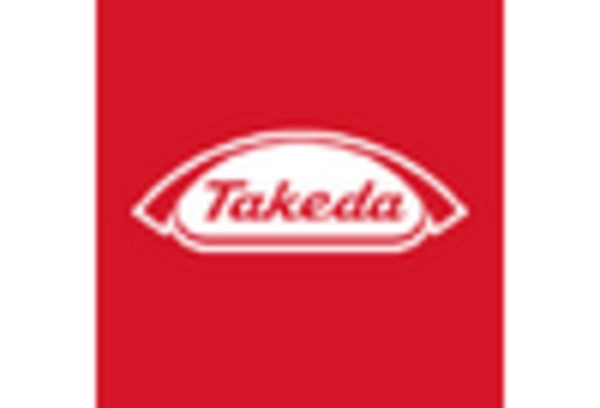Rising Healthcare Expenditure
The increasing healthcare expenditure in Japan is another significant driver for the hematopoietic stem-cell-transplantation market. As the country invests more in healthcare services, there is a growing focus on advanced treatment options, including stem cell transplants. In 2025, Japan's healthcare expenditure is projected to reach approximately $500 billion, reflecting a commitment to improving patient care. This rise in spending is likely to enhance the availability of cutting-edge treatments and technologies in hospitals and clinics. Additionally, as more healthcare facilities adopt advanced transplantation techniques, the overall quality of care is expected to improve, further driving the demand for hematopoietic stem-cell transplantation. Consequently, the upward trend in healthcare expenditure is poised to positively impact the market.
Government Initiatives and Funding
Government initiatives and funding play a pivotal role in shaping the hematopoietic stem-cell-transplantation market. The Japanese government has been actively promoting research and development in regenerative medicine, including stem cell therapies. In 2023, the government allocated approximately $200 million to support clinical trials and research projects focused on hematopoietic stem-cell transplantation. This financial backing is likely to accelerate innovation and improve treatment accessibility for patients. Furthermore, regulatory bodies in Japan are streamlining approval processes for new therapies, which may encourage more companies to invest in the hematopoietic stem-cell-transplantation market. As a result, the combination of government support and funding is expected to foster a conducive environment for growth and development in this sector.
Advancements in Stem Cell Technology
Technological innovations in stem cell research and transplantation techniques are significantly influencing the hematopoietic stem-cell-transplantation market. Recent developments in gene editing, such as CRISPR, and improved cell processing methods are enhancing the efficacy and safety of transplants. For instance, the introduction of haploidentical transplants has expanded donor options, making it easier for patients to find suitable matches. In Japan, the market for stem cell therapies is projected to grow at a CAGR of around 12% over the next five years, driven by these advancements. Additionally, the integration of artificial intelligence in donor matching and post-transplant monitoring is expected to streamline processes and improve patient outcomes. These technological advancements not only enhance treatment efficacy but also contribute to the overall growth of the hematopoietic stem-cell-transplantation market.
Increasing Incidence of Hematological Disorders
The rising incidence of hematological disorders in Japan is a crucial driver for the hematopoietic stem-cell-transplantation market. Conditions such as leukemia, lymphoma, and multiple myeloma are becoming more prevalent, necessitating advanced treatment options. According to recent health statistics, the incidence of leukemia in Japan has been reported at approximately 10.5 cases per 100,000 individuals. This growing patient population is likely to increase the demand for stem cell transplants, as they are often the most effective treatment for these diseases. Furthermore, the aging population in Japan, which is projected to reach 36% of the total population by 2040, may further exacerbate this trend. As a result, healthcare providers are increasingly focusing on expanding their hematopoietic stem-cell-transplantation capabilities to meet the anticipated demand.
Collaboration Between Research Institutions and Healthcare Providers
Collaboration between research institutions and healthcare providers is emerging as a vital driver for the hematopoietic stem-cell-transplantation market. Partnerships between universities, research centers, and hospitals are fostering innovation and facilitating the translation of research findings into clinical practice. In Japan, several prominent institutions are working together to develop new transplantation protocols and improve patient outcomes. These collaborations often lead to clinical trials that explore novel therapies and techniques, thereby enhancing the overall landscape of hematopoietic stem-cell transplantation. Furthermore, such partnerships can attract funding and resources, which may further accelerate advancements in the field. As a result, the synergy between research and clinical practice is likely to contribute to the growth and evolution of the hematopoietic stem-cell-transplantation market.
















